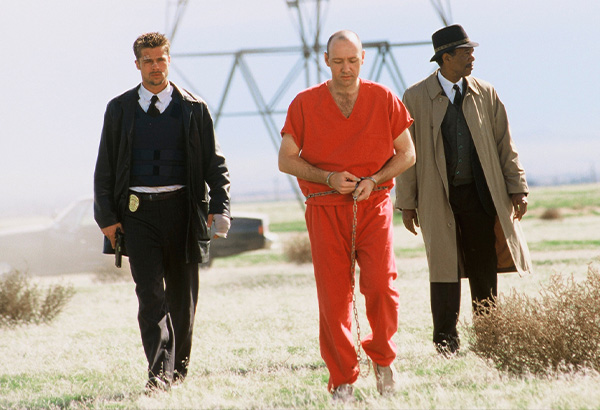David Fincher stands as one of the most distinctive directors of psychological thrillers, known for his chilling portrayals of the human mind’s darkest corners. Films like Se7en, Fight Club, and Gone Girl immerse audiences in high-stakes scenarios, exploring themes of obsession, moral decay, and identity. Fincher’s complex storytelling and haunting visual style continue to challenge viewers, making his films unforgettable experiences that linger long after the credits roll.
What Makes David Fincher’s Directing Style So Unique?
Fincher’s signature style involves meticulous attention to detail and a mastery of visual storytelling, building psychological tension with chilling accuracy. His cold colour palettes, pervasive shadows, and sharp cinematography create an intense atmosphere, pulling audiences into his characters’ troubled minds. Fincher often employs slow zooms, precise framing, and digital filmmaking techniques that intensify each scene, pushing viewers to confront his characters’ emotions and psychological struggles. This unique style transforms his films into immersive experiences, enhancing the suspense and depth of each narrative.
How Does Fincher Build Tension Through Storytelling?
In Fincher’s films, psychological tension is constructed through two key storytelling elements: unexpected narrative twists and character-driven suspense.
Twists, Turns, and Unpredictability in the Narrative
Fincher’s stories are notorious for their shocking twists and ambiguity, keeping viewers on edge and eager to uncover each mystery. Films like Gone Girl and The Game use red herrings and abrupt revelations that shift audience expectations, creating an atmosphere where nothing is predictable. This sense of uncertainty not only heightens suspense but also emphasises the psychological weight carried by his characters.
Character-Driven Suspense
In Fincher’s world, the inner lives of his characters often drive the suspense. Whether they’re grappling with moral dilemmas or haunted by personal demons, his characters navigate complex emotional landscapes that make each moment unpredictable. In Fight Club and Zodiac, protagonists face a blur of moral lines, causing the audience to question who is “good” or “bad.” This depth gives Fincher’s characters a compelling authenticity, making the tension in his films more personal and impactful.
What Are David Fincher’s Best Psychological Thrillers?
Some of Fincher’s most iconic psychological thrillers explore a range of human fears and fascinations. Let’s look at four of his most captivating works:
Se7en (1995) – The Darkness of Human Nature
Se7en delves into the grim underworld of morality and sin, following two detectives as they unravel a series of brutal crimes tied to the seven deadly sins. Fincher’s bleak visuals, dark cityscapes, and the detectives’ descent into despair create a disturbing tone, examining humanity’s capacity for evil. The shocking conclusion leaves a lasting impression, cementing Se7en as one of the most intense thrillers of the 1990s.
Fight Club (1999) – Identity and Chaos
Fight Club tackles themes of consumerism, masculinity, and the search for self in a modern, materialistic world. The film follows an unnamed protagonist whose psychological unravelling leads to the creation of Tyler Durden, a character embodying rebellion and anarchy. The narrative twist reveals the protagonist’s fractured identity, making Fight Club a timeless commentary on identity and personal chaos, as well as a pop culture phenomenon.
Gone Girl (2014) – Marriage and Manipulation
Exploring themes of manipulation and the facades people maintain, Gone Girl dives into the complexities of a strained marriage that takes a dark turn. Fincher crafts a thrilling narrative that examines media influence, deception, and control. The film’s unpredictable twists and disturbing psychology keep viewers questioning each character’s motives, making it a captivating and unsettling exploration of human relationships.
The Killer (2023) – The Isolation of a Hitman’s Mind
The Killer (2023) explores the detached, methodical psyche of a professional assassin. Following the internal monologue and rigid routines of the protagonist, the film examines themes of isolation, precision, and paranoia. Fincher’s meticulous style amplifies the suspense, using silence and stark visuals to create a portrait of an antihero whose cold calculations make for a hauntingly tense atmosphere.
How Does Fincher Control Pacing to Build Suspense?
Fincher expertly uses pacing to draw out suspense, often employing slow, deliberate scenes that allow tension to simmer before reaching a breaking point. In films like Zodiac and The Girl with the Dragon Tattoo, Fincher’s methodical storytelling style keeps viewers engaged, drawing them deeper into the mystery with each scene. By balancing slow pacing with intense, sudden shifts, Fincher creates an experience that mirrors the unpredictability of his characters’ psychological states.
How Has David Fincher Shaped the Psychological Thriller Genre?
David Fincher’s focus on complex, dark themes and his meticulous control over suspense have redefined the psychological thriller genre. His consistent dedication to exploring human psychology, combined with his innovative visual techniques, has influenced countless modern filmmakers who strive to capture similar tension and emotional depth. Fincher’s unique approach has not only pushed the genre’s boundaries but also set a new standard for creating truly immersive thrillers.
The Lasting Impact of Fincher’s Psychological Thrillers
David Fincher’s psychological thrillers remain powerful and thought-provoking, captivating audiences with their blend of suspense, depth, and visual mastery. His unique storytelling approach continues to influence modern cinema, challenging viewers to confront the darkest aspects of human nature. Fincher’s films stay with us long after they’ve ended because they’re more than just movies—they’re explorations of the mind, urging us to question our perceptions and confront the unknown.
For more articles on your favourite directors, movie genres, and the latest in cinema, click here.
Catch the next screening at a Ster-Kinekor near you.

